Master of the Universe
Driven by an insatiable appetite for adventure, Sir Richard Branson has made billions defying the odds. Now the visionary entrepreneur is setting out to conquer the greatest frontier of all.

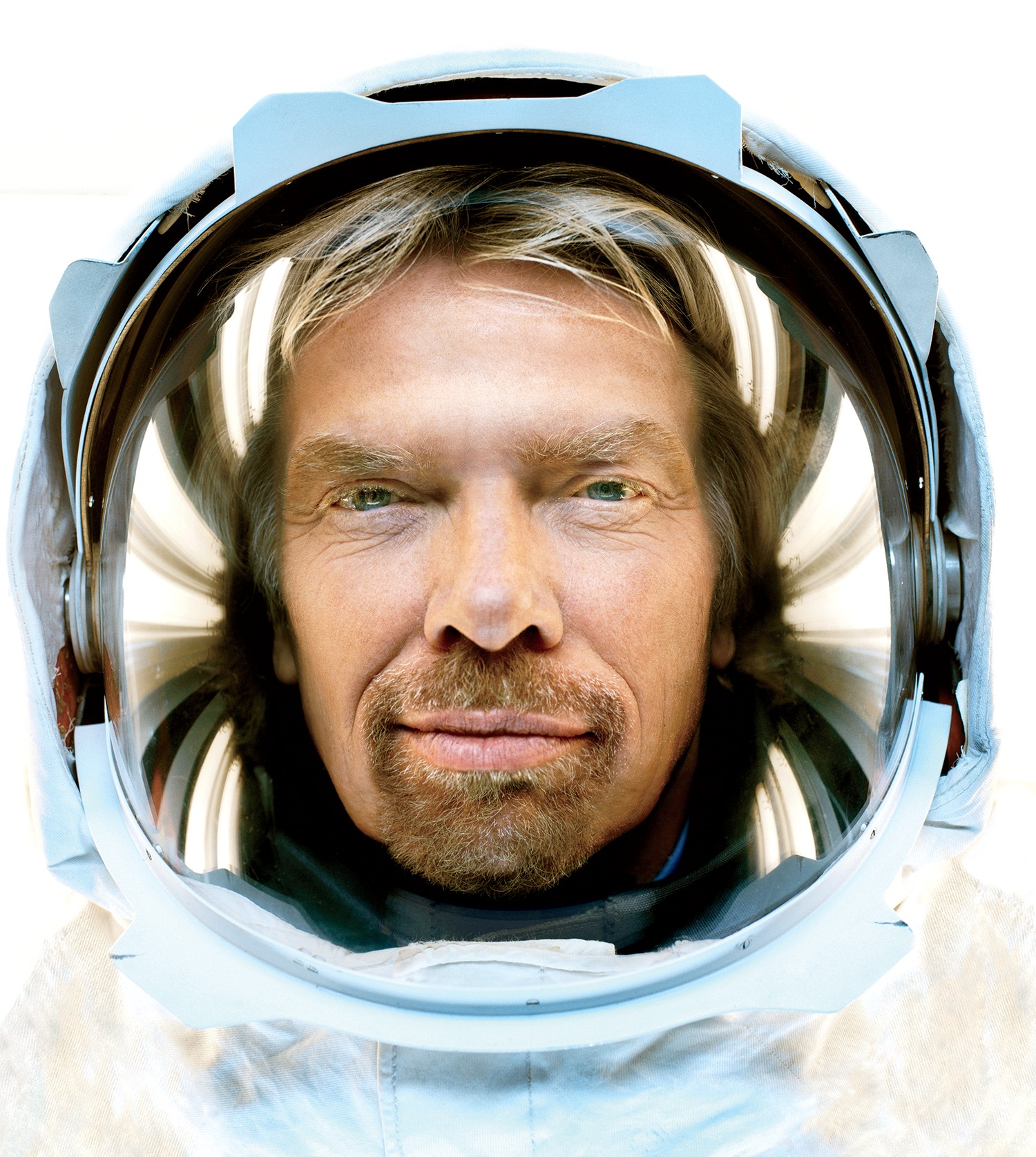
Richard Branson has lived his life according to a simple motto: Screw it, let’s do it (his words).
Since leaving school at the age of 16 to start his first business, the founder of the Virgin Group has driven a tank down Fifth Avenue, crossed the English Channel in an amphibious car, taken a 407-foot jump off the Palms Casino Resort in Las Vegas, and traveled from Morocco to Hawaii in a hot-air balloon. He’s started more than 100 different companies, including a major record label and two high-profile airlines, and made a career of challenging corporate giants. He’s a master show- man in the P. T. Barnum vein, adept at catching the public’s eye with clever publicity stunts (thus the tank and the leap off the casino roof), and he’s been brilliant at understanding what consumers want and delivering it to them. He’s also been brilliant at fashioning a winning public image—fearless, irreverent, more interested in fun than profit—which over the years has become one of Virgin’s major assets and turned him into one of the greatest business impresarios in history. Yet despite all the success, which has driven his personal net worth north of $5 billion, he’s remained permanently restless. An archetypal entrepreneur, Branson has never stopped looking for the next big idea. He believes he’s found it in Virgin Galactic, a company that wants to put ordinary people into space. And he’s done it all, as he says, while working from a hammock on the private island in the Caribbean where he lives.
Branson’s entrepreneurial zeal was there from the start. When he was growing up in London, his mother was a small-businesswoman in her own right, doing things like making waste-bin covers that she sold to Harrods. “I was always fascinated by my mother’s moneymaking projects,” Branson says today. “If an item didn’t sell, she tried something else. She always taught me never to look back in regret, but to move on to the next thing.” And she pushed Branson to rely on his own devices to get ahead. When he was just a little boy, for instance, she once stopped the car when they were returning to the family house and told him to get out and find his way home. That kind of pressure might have crushed some kids. Branson seems to have flourished—even as a child, he tried various business schemes, like growing Christmas trees and selling birds.
Those schemes, as Branson’s mother once put it, almost all ended up “in some form of disaster, with us picking up the pieces.” But in what would become the defining pattern of his business life, failure didn’t diminish his appetite for new ventures. While he was still in high school, he started a magazine called Student with a friend; at 16, he actually dropped out of school to try to turn it into a full-time business, running the magazine at first out of a crypt in a vicar’s basement, of all places. Student was an unusual combination of literature, music, and politics, and Branson managed to somehow publish writers like Jean-Paul Sartre while finagling interviews with people like John Lennon and Vanessa Redgrave.
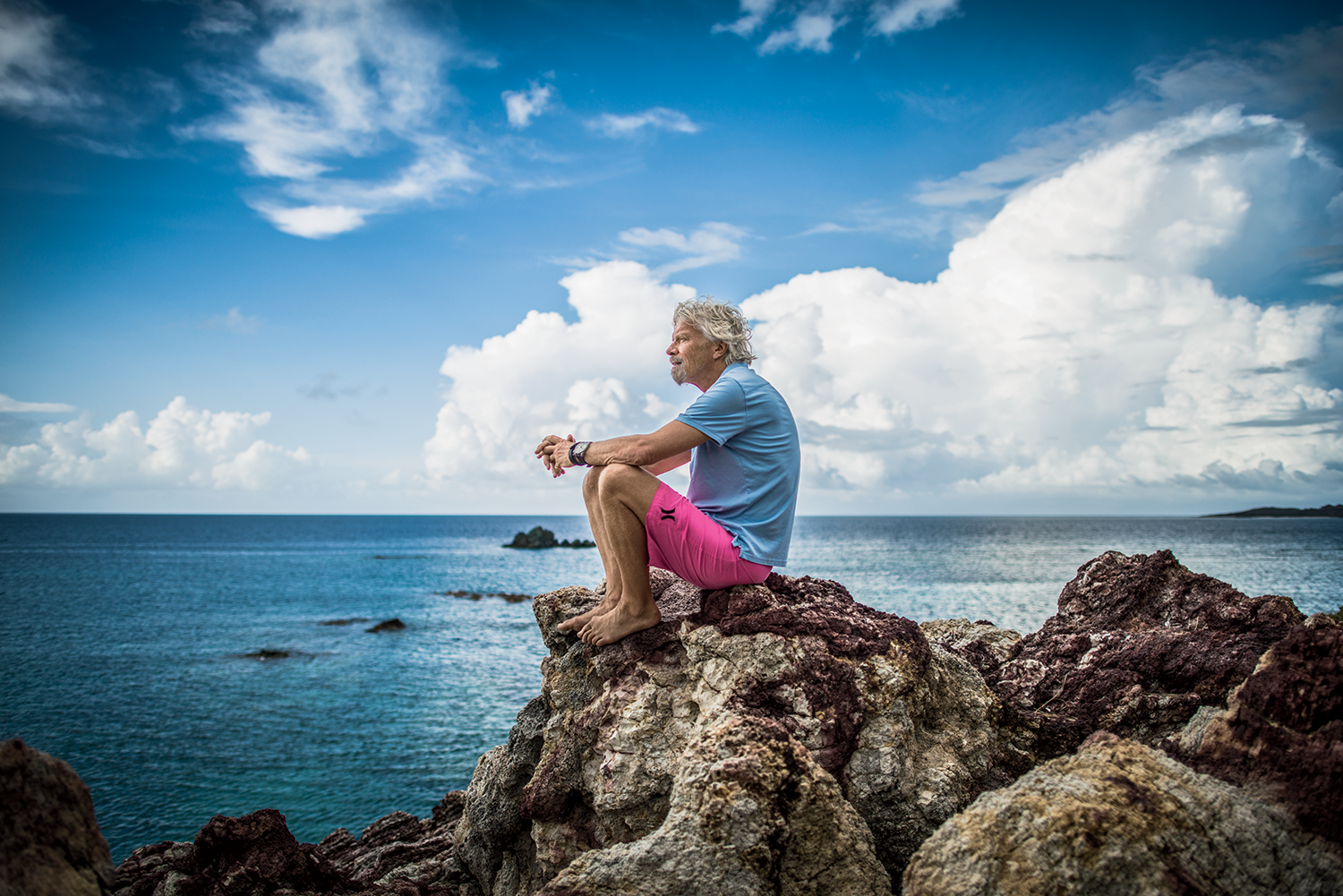
That was heady company for a teenager, but Student was a struggle to keep afloat, and Branson soon branched out into the record-selling business. He started by offering cut-price records via mail order, something apparently few had done before. Then he and his partner opened a store of their own, which they called Virgin Records, designing it to be as much a community center as a retail shop. They put in a coffee bar and beanbags, and actively encouraged people to come and hang out—in much the way that stores like Barnes & Noble would decades later. “There was no master plan,” Branson says. “We just enjoyed what we did and made sure we had enough to pay the bills each month.”
When Branson left school, his headmaster had said, “I predict you will either end up in prison or a millionaire.” Prescient words: Before he became a millionaire, Branson nearly did end up in prison. At the time, record sales in Britain were taxed at a high rate, and Branson hit on what he thought was a clever way to evade those taxes. Instead, he was caught and tossed in jail, and was only able to avert getting sent away when his parents put up their house as collateral and he agreed to repay 60,000 pounds.
“Whether the challenges are physical or financial, fun has for me always been inextricably linked with taking risks, and sometimes perhaps some pretty insane ones.”
That experience, as Branson describes it, made him more conscious of minding the law. But it didn’t make him any more cautious. He soon expanded the record store into a record label under the same name. He bought a big house in the countryside, which he dubbed the Manor, where he built a recording studio. And in 1973, Virgin Records took off, thanks largely to Mike Oldfield’s eerie instrumental album Tubular Bells (which is probably best known in the U.S. as the soundtrack to The Exorcist). Tubular Bells became an immense hit, ultimately selling 17 million copies and giving Virgin financial security. In the years that followed, Virgin became the biggest independent label in the U.K. It signed the Sex Pistols after they were dropped by A&M, and developed a deep roster of punk and post-punk bands. It started an influential reggae imprint and had a stable of mainstream stars, including Culture Club, Genesis, and Simple Minds.
Branson’s flair for promotional stunts, which would become a signature, was on display right from the beginning. The most famous of these came during the Queen’s Silver Jubilee in 1977. The Sex Pistols’ “God Save the Queen” had been banned by the BBC, so Branson put the band on a boat and sailed it down the Thames, creating the spectacle of the Pistols blasting “Anarchy in the U.K.” while outside of Parliament. (The show was eventually shut down by the police.) Virgin also became legendary for throwing massive parties at the Manor.
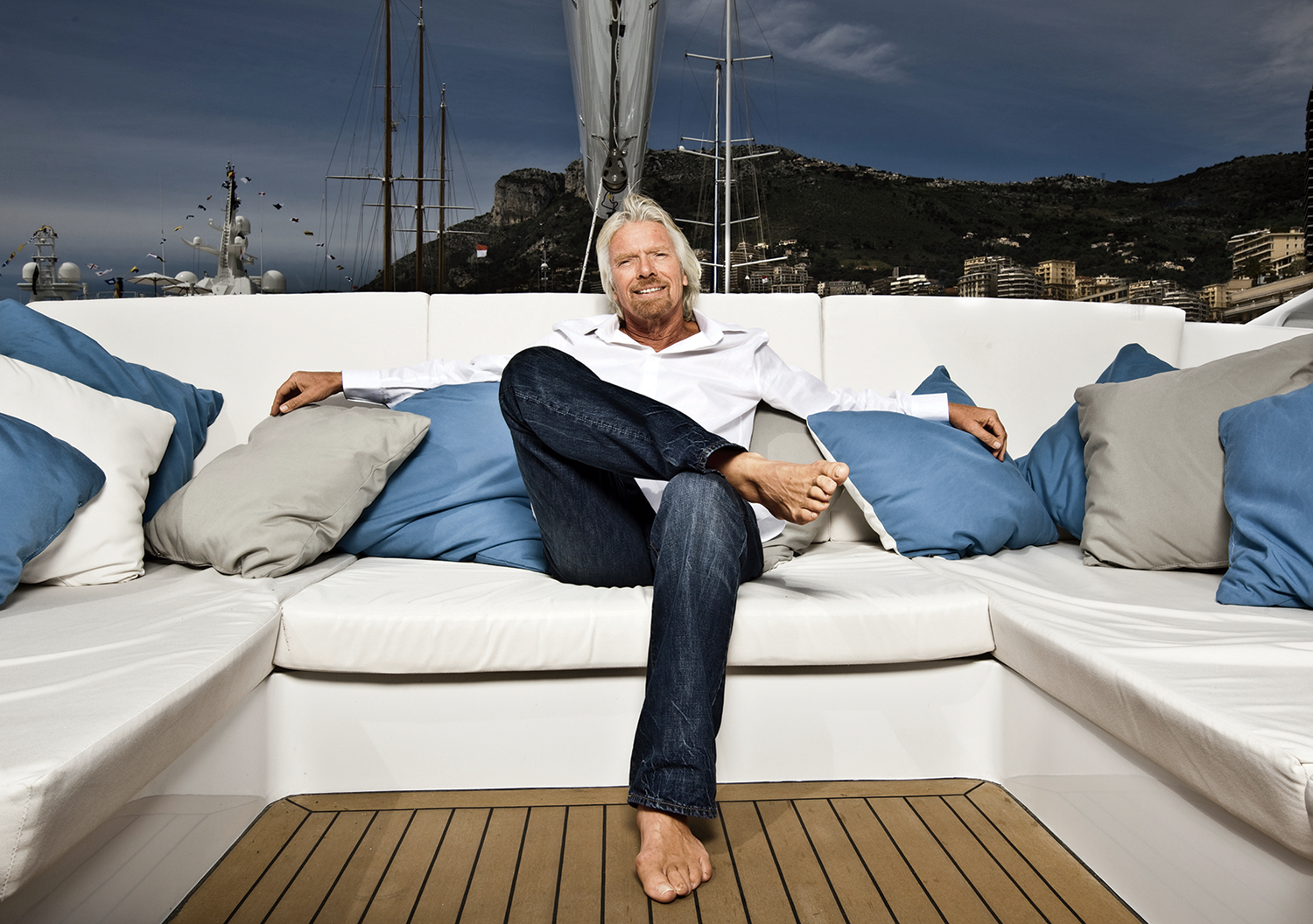
But the success of Virgin Records wasn’t enough for Branson. So he set about starting a host of new ventures. Some of them, like a film and entertainment company, were theoretically connected to Virgin’s original business; others seemed to have nothing at all to do with it. Then in 1983, Branson made the move that would prove to be the crucial moment in his career—he decided to start Virgin Atlantic, a transatlantic airline.
This was, most people thought at the time, a “lunatic venture.” As Branson himself has said, his knowledge of the airline business “hovered right around the zero mark.” The industry was then, as it is now, dominated by big, incumbent international players who controlled landing slots at the major airports and had considerable political clout. The airline business itself is a notoriously difficult one, since airlines are subject to the price of fuel, the whims of travelers, bad weather, and so on. And historically, it’s been hard for airlines to differentiate themselves from competitors, leaving them vulnerable to price wars. The history of the business, not surprisingly, was littered with airlines that had gone bankrupt and upstarts that had barely managed to get off the ground.
And as Branson tells it, Virgin Atlantic very nearly didn’t, thanks to some high drama when it launched with a single plane. “Despite careful planning, we were almost sunk after our first trip when a bird flew into the engine and we had to use our reserves to buy a new plane,” he recalls. “I had the bank manager on my doorstep on the Friday evening, saying he would foreclose on the whole Virgin Group that Monday. I pushed him out of my house and told him he wasn’t welcome. Then in half-anger, half-fear, I spent the weekend asking people to chip in. The next week I changed banks.”
So why did Branson do it? Some of it, surely, was just his appetite for long odds—he never seems happier than when trying something that everyone else believes will fail. (“It was a big leap,” he admits.) But there was also something that he saw, an opportunity others had missed: The experience of flying commercial airlines was, for the most part, fairly unpleasant. Virgin didn’t want to compete on price alone, since that was a recipe for a race to the bottom. Branson’s thought was that if you could provide better, and more distinctive, service and still keep prices reasonable, there was a chance to steal market share from the big players. As Branson says, “We took the same customer-focused approach we had with our music businesses and added all kinds of little service extras.” And so Virgin offered its first-class passengers complimentary limo service. It built the first real high-end airline lounges and offered the first video players. It even became the first airline to scrap those weird gray rubber headphone tubes and offer customers cheap portable headphones instead.
On top of this, the airline industry was tailor-made for Virgin’s David- vs.-Goliath approach. It was an industry dominated by big, established players, and in Britain, by one huge player: British Airways. Branson built Virgin on irreverence and tweaking the powers that be, and stuffy, old-fashioned British Airways was an easy target for tweaking. It was really with Virgin Atlantic that Branson’s true genius for branding emerged—he understood that an anti-corporate image could, paradoxically, make you a lot of money. Virgin’s irreverence wasn’t just a strategy; it was also an expression of Branson’s own personality, and it paid dividends. Virgin earned reams of free publicity thanks to its campy stunts and clever advertising. On the eve of Virgin’s first flight from Heathrow, for instance, Branson posed for photographs dressed as a pirate (complete with stuffed parrot) in front of the huge model of BA’s Concorde that stood at the entrance to the airport, while workmen draped a Virgin logo over the BA insignia on the plane’s tail fin. Virgin also became a master of cheeky ads, often designed to needle British Airways, conveying the message that Virgin was more fun and less uptight than its competitors. When the U.S. Justice Department extradited Panama strongman Manuel Noriega for trial on drug charges, Virgin ran an ad with a big picture of Noriega and the caption, “Only one person has flown to Miami cheaper than on Virgin Atlantic!”
On the face of it, Virgin’s move into the airline business made little sense. But there was, if you looked closely enough, a logic to what Branson was trying to do. Virgin’s companies tended to deal directly with consumers, and its successful ventures were typically in businesses where the customer experience was lacking: too complicated, too expensive for the value delivered, and too unstylish. Virgin, it turned out, had what management theorists called a “core competency,” and that was improving the customer experience. And when Virgin has succeeded, that’s precisely what it’s done.
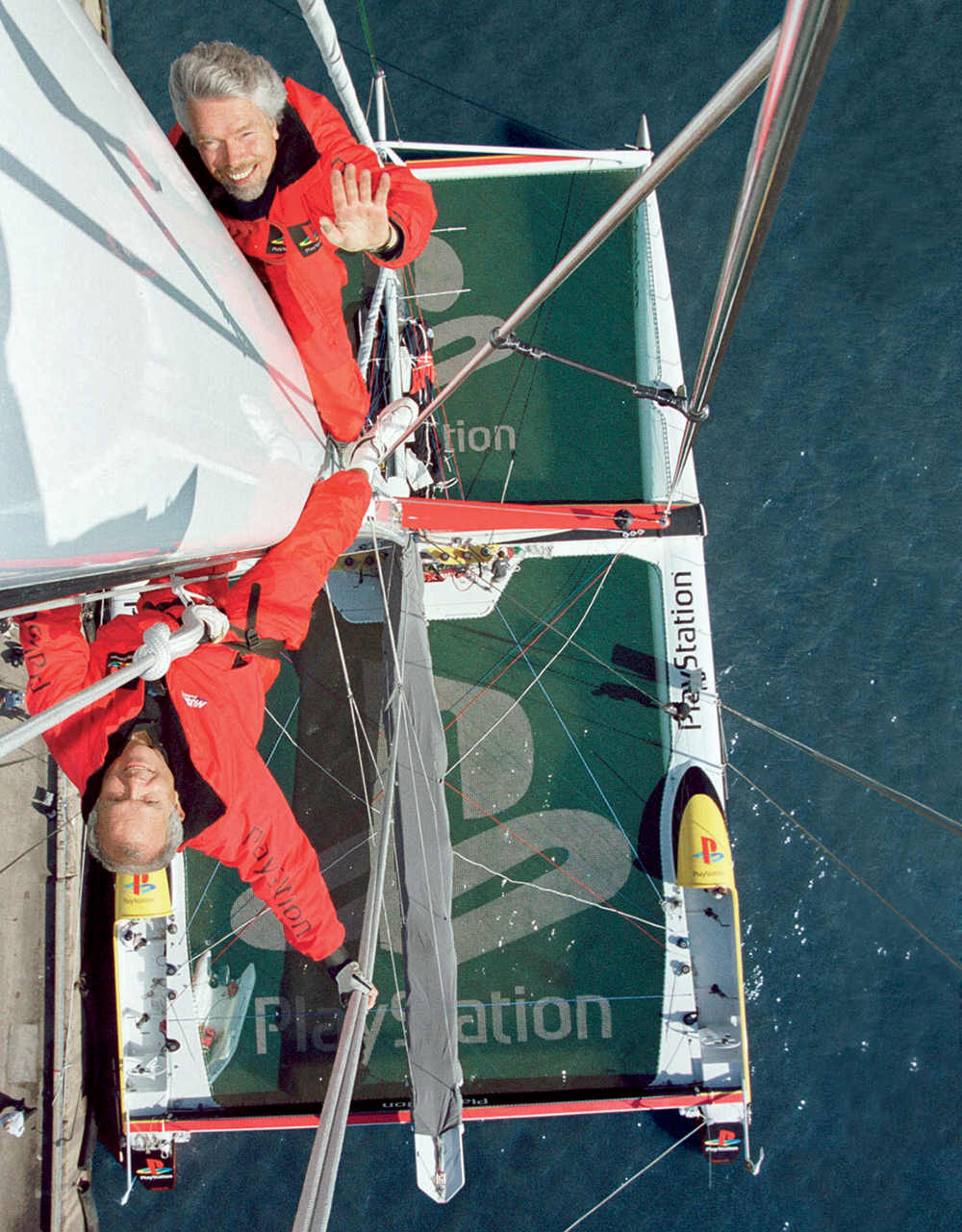
Still, while clever promotions and friendly service can get you a lot, they can’t make up for everything. And while Virgin Atlantic was a success in its early days, by the early 1990s it was struggling to stay afloat. Fuel prices were rising, travel was down across the industry, and the company found itself at serious risk of going broke. Branson would later say that this was the one time in his career when he felt “totally lost.” To save the airline, he gave up the record company, selling Virgin Records to Thorn-EMI.
You might have thought that this near brush with death would have tempered Branson’s appetite for risk. Instead, it just emboldened him, and over the next decade Virgin started dozens of new companies. There were some real hits, like Virgin Mobile (which eventually became Virgin Media) and Virgin Trains. And while there were also plenty of misses (Virgin Brides, Virgin Vodka, Virgin Cosmetics, and Virgin Cars, an online auto retailer), Branson knew going in that some of his gambles wouldn’t pay off. His willingness to fail, in that sense, was a crucial part of his success.
Virgin is often held up as a testament to the power of branding—just attach the Virgin name to a new business and watch the money roll in. In fact, Branson’s new businesses have succeeded when they offered real value for the money and had something—better service, sharper design, an easier customer experience—that their competitors didn’t. The best Virgin companies have inspired not just satisfaction but devotion among their customers. Virgin America, his U.S.-based airline, for instance, leapt to the top of consumer surveys almost as soon as it debuted. When that component was missing, however, even the splashiest marketing couldn’t make up the difference. For the debut of Virgin Cola, Branson rather amazingly drove a tank through a wall of Coke cans in Times Square. But Virgin Cola couldn’t break through, and within three years it was off the shelves. Today, Branson says: “Declaring a soft drink war on Coke was madness. I consider our cola venture to be one of the biggest mistakes we ever made.” Then he adds something telling: “But I still wouldn’t change a thing.”
And that’s what makes Branson so unusual. Businesspeople talk all the time about how important it is to take risks, but in the end, few of them are truly comfortable with the possibility that things might not work out. Branson seems to genuinely embrace it, and that’s allowed him to do more—and risk more— than most.
“I consider our cola venture to be one of the biggest mistakes we ever made. But I still wouldn’t change a thing.”
That insatiable urge to tempt fate isn’t only true of Branson’s business life. In the late 1980s, after Branson had helped set a record for the fastest crossing of the Atlantic via powerboat, a famous balloonist named Per Lindstrand asked him to try to cross the same ocean in a hot-air balloon. As Branson put it, “I had never been in a balloon before. No one had ever flown that far in a balloon before. It was mad. It was too risky.” Of course he went. The trip ended with Lindstrand and Branson being rescued from the icy sea off the coast of Scotland, after first Lindstrand and then Branson had leapt from the balloon into the ocean because they missed the beach where they had intended to land. Branson’s verdict on the trip: “It was an amazing experience.” And, in fact, a few years later he and Lindstrand decided to try to cross the Pacific in a balloon, a venture that again nearly ended in complete disaster.
Foolhardy as these “public attempts at self-destruction” (as Bran- son has called them) may seem to some, there’s also something inspiring about Branson’s willingness to throw caution to the wind—literally, in the case of his balloon trips. And while it’s true that there was often a Virgin logo plastered somewhere, it’s clear he wasn’t doing all this stuff just as a marketing ploy. He was doing it because he liked it. As he puts it, “Whether the challenges are physical or financial—or sometimes both—fun, a.k.a. excitement, has for me always been inextricably linked with taking risks, and sometimes perhaps some pretty insane ones.”
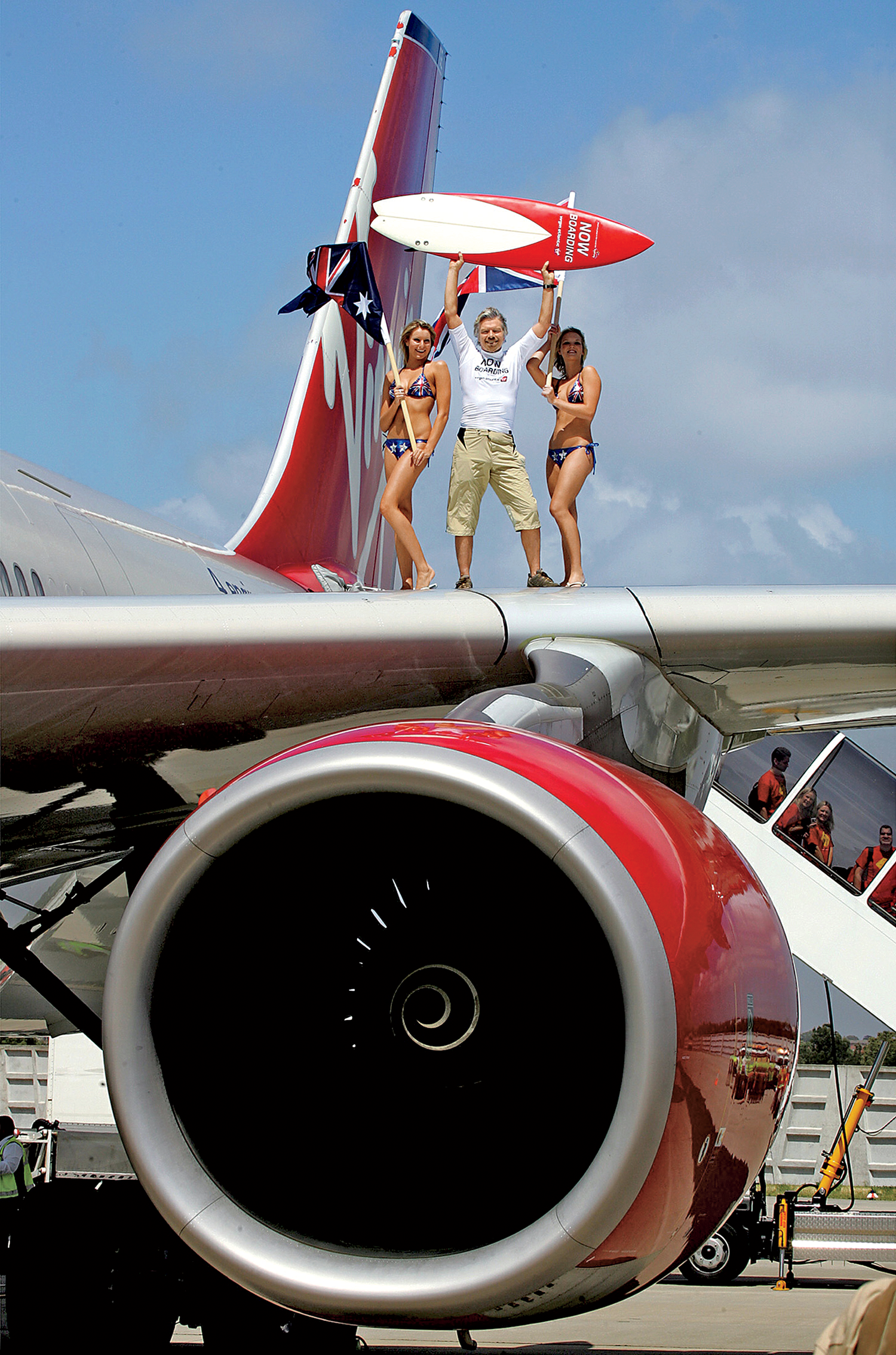
This wide-ranging need to push limits makes Branson unusual even among entrepreneurs. In fact, studies of entrepreneurs suggest that most are not actually risk-seeking in their nonbusiness lives. They’re just way too optimistic about the likelihood that their businesses will succeed. In other words, they’re willing to gamble on an uncertain future because they don’t really understand how unlikely business success is. Branson, by contrast, is both exceedingly optimistic and exceedingly comfortable with risks of all kinds.
In that respect, it’s unsurprising that his most important recent project is risky in both a business and a literal sense. That project is Virgin Galactic, a venture whose goal, in Branson’s words, is “democratizing access to space.” The company, which was founded in 2004, has promised to build a small, two-pilot, six-passenger ship that can launch from a base in New Mexico, fly up more than 200,000 feet, leaving Earth’s atmosphere, and then glide before returning to Earth. The prospect of this is alluring enough that 700 people have put down deposits on future flights, at a reputed cost of $250,000 apiece.
As a business, the stakes involved in space travel are as serious as they get. In the fall of 2014, the company’s SpaceShipTwo broke apart and crashed on a test flight, killing one of the two pilots. And though the National Transportation Safety Board concluded the accident was the result of the copilot’s error, it was nonetheless a major setback for the company, and there was speculation at the time that it would simply shut down. Instead, against the odds yet again, Branson regrouped, and the new SpaceShipTwo is now scheduled for test flights later this year. Branson is saying that consumers will be in space before the end of the decade.
That may well be a crazy bet. But Branson has made his fortune on crazy bets. And with Virgin Galactic, he’s actually going further than he has before. Instead of just shaking up an entrenched industry, he’s attempting to create an entirely new one. This is, in a way, what his entire career has been building toward: a genuinely audacious project that pushes against the boundaries of what people think is possible. In economic terms, Virgin Galactic may not be purely rational. But that actually makes the project all the more valuable. What an economy needs are precisely those people who are willing to take gambles that a more prudent analysis would counsel against. We live in a time when big corporations are sitting on huge cash hoards, because they can’t find any investments they think are worth the risk. And while that may be smart for them, it’s bad for the rest of us, since it means all that money isn’t being put to work. Branson, by contrast, has the attitude of a true entrepreneur: “Money is for making things happen.” And make things happen he has.
